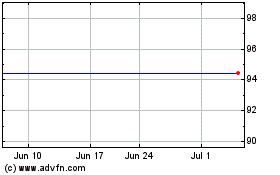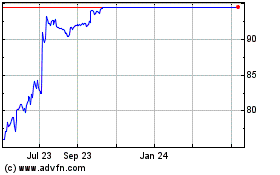Shooting at Videogame Event Puts Focus on Security
August 27 2018 - 4:43PM
Dow Jones News
By Sarah E. Needleman
The heads of professional videogame teams said they would
evaluate security procedures after a mass shooting at a competition
in Jacksonville, Fla., on Sunday, as the industry undergoes rapid
growth and attempts to manage highly paid players who are also
social-media stars.
In esports, players compete at videogames individually or on
squads, typically for cash prizes. Matches are commonly broadcast
live online, from venues such as small bars for amateur events to
big arenas like New York's Barclays Center for professional
competitions.
Esports executive Ben Spoont said he now plans to check with
event organizers about their security before sending his
approximately 45 players to any competitions held at small
venues.
"To actually feel a need to make sure someone doesn't have a
weapon, that's not been a primary concern in the past," said Mr.
Spoont, who heads up the esports organization Misfits Gaming, and
the Florida Mayhem, a team that competes in Activision Blizzard
Inc.'s Overwatch League. He also plans to start having bag checks
and metal detectors at tournaments and fan events that his own
organization hosts. "This was a wake-up call, " he said.
On Sunday, at a bar in Jacksonville dedicated to competitive and
casual videogaming, an attacker opened fire with a handgun, killing
two and himself as well as injuring nine, local authorities said.
Players of varying skills were competing in the popular videogame
series "Madden NFL" to qualify for a spot in a larger event in Las
Vegas with a prize pool of $165,000. The Journal couldn't determine
what, if any, security measures were in place.
By contrast, matches for professional gamers typically take
place in studios, stadiums or other locations where spectators
purchase tickets and security staff and metal detectors are the
norm. Professionals who play on teams can command annual salaries
greater than $100,000.
"It's time esports events (large and small) double down on
security for everyone in general and players specifically," Jason
Lake, chief executive of the professional esports team Complexity
Gaming, wrote on Twitter. One of the team's players, Drini Gjoka,
was participating in the videogame competition in Jacksonville and
escaped after one of his thumbs was struck by a bullet.
ESL, an organizer of several hundred esports competitions of
varying sizes every year world-wide, is rethinking its approach to
event safety. "Out of this tragedy we are reviewing security
policies and how these are implemented," a spokesman for ESL said
by email. "We will take action where necessary to protect our
community, partners and everyone associated."
The pro esports organization Splyce is planning a company-wide
meeting this week on "how we can both make sure people are ok after
this awful event and what we can do going forward to be proactive,"
said its chief executive Marty Strenczewilk in a tweet. In an
email, Mr. Strenczewilk said it will take time to come up with a
plan.
Finals matches for pro leagues attract hundreds of millions of
online viewers and fans pack stadiums such as New York's Barclays
Center and Los Angeles' Staples Center. Major brands such as
T-Mobile Inc. and Coca-Cola Co. sponsor teams and events, and top
players have massive online followings.
This year, 222 million spectators world-wide are expected to
watch esports events at least once a month online or in person,
more than double the number from 2012, according to Newzoo BV.
Revenue from corporate sponsorships, media rights, ticket sales and
other sources is on track to top $1 billion by 2019, according to
the videogame industry tracker.
Some teams have already beefed up safety efforts for players.
The Dallas Fuel, also part of the Overwatch League, hired three
police officers to keep tabs on its nine players and three coaches
last month during a fan-appreciation event at a Dallas mall.
"The smaller events absolutely need much more security," said
Mike Rufail, chief executive of the Dallas Fuel as well as the
esports organization Team Envyus. "The smaller amateur, semipro
events are really susceptible to what happened in
Jacksonville."
But for most players, competitions are in small bars, far away
from arenas. Waypoint Cafe in New York, where mostly high-school
and college students compete in esports matches, has security
cameras but nothing else. The cafe hosts its own tournaments and
players sometimes use its 30 computers to participate in qualifiers
for professional tournaments.
Luigino Gigante, who opened up Waypoint last September, said the
cafe is small -- 1,750 square feet -- and doesn't have room for a
metal detector. But since his customers usually behave well, he
said he wouldn't add one even if he had the space. "We don't have a
need for it, " Mr. Gigante said.
Write to Sarah E. Needleman at sarah.needleman@wsj.com
(END) Dow Jones Newswires
August 27, 2018 16:28 ET (20:28 GMT)
Copyright (c) 2018 Dow Jones & Company, Inc.
Activision Blizzard (NASDAQ:ATVI)
Historical Stock Chart
From Mar 2024 to Apr 2024

Activision Blizzard (NASDAQ:ATVI)
Historical Stock Chart
From Apr 2023 to Apr 2024
